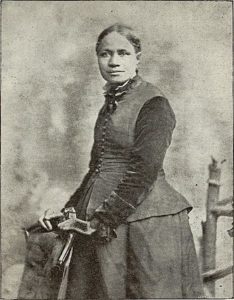
Frances E. W. Harper
Frances Ellen Watkins Harper was born on this date in 1825. She was a Black poet, writer, lecturer, and anti-slavery, women's rights, and temperance activist.
Harper was from Baltimore, MD., where she attended Baltimore's Academy for Negro Youth school. There, she studied Greek, Latin, and the Bible. Writing poetry as a teenager, she started her career as a writer in 1845 by publishing the poetry collection "Forest Leaves."
Her second career as an abolitionist began almost a decade later. Harper taught school for several years at Union Seminary in Ohio and later in Pennsylvania. But in 1853, when Maryland began prohibiting free blacks from entering its borders, Frances Ellen Harper was moved to action. The next year, moving to Philadelphia, she became active in the anti-slavery movement. Soon, Harper became one of the few Black women to go on the anti-slavery lecture circuit. She proved to be such a popular speaker that over the next six years, the Maine and Pennsylvania Anti-Slavery Societies sent her throughout New England, Ohio, and New York, and as far away as Detroit and Canada.
Harper often quoted original poetry in her lectures, and consequently, her reputation as a poet spread as far as her speaking tours. Her second volume of poetry, Poems on Miscellaneous Subjects, sold 10,000 copies and was then enlarged and reprinted. Harper published several more volumes of poetry and reprinted new editions of her poems many times. In the process, she became the most famous black poet of her time.
During the next few decades, she began to focus on racial uplift, moral reform, temperance, and women's rights. Many of Harper's lectures were to women's clubs and associations, and some of her most popular speeches were on the rights and roles of women in general and Black women in particular. Harper was also active in the temperance movement. She lectured widely on the evils of alcohol, directed the Northern United States Temperance Union, and became the first Black woman to be recognized on the Red Letter Calendar of the World Woman's Christian Temperance Union, which honored prominent temperance activists.
Again, Harper tailored her activism to reach the Black community. She directed what were then called the colored branches of the Philadelphia and Pennsylvania Woman's Christian Temperance Union and, in 1883, became the national superintendent of temperance work among blacks.
Throughout her political activism, Frances Harper continued to write, and in the 20th century, she is best remembered as one of the earliest Black women writers. Harper's best-known work is the 1892 novel Iola Leroy. Many reviewers called it the crowning effort of Harper's life. She continued writing until a few years before she died in 1911.
Harper provided a model for what any 19th-century woman could be as a black woman. In writing about and speaking to other black women, she set a high standard for a generation of African American women's activism.
Black Women in America: An Historical Encyclopedia
Volumes 1 and 2, edited by Darlene Clark Hine
Copyright 1993, Carlson Publishing Inc., Brooklyn, New York
ISBN 0-926019-61-9